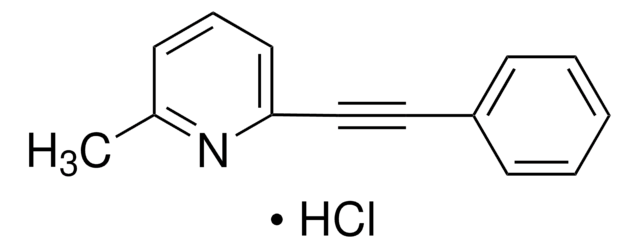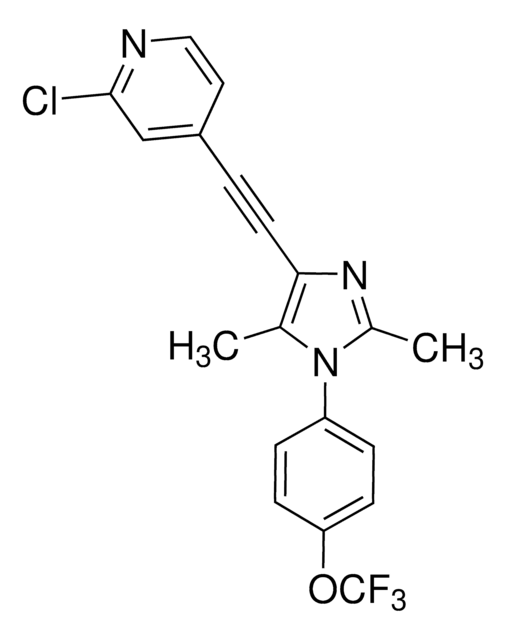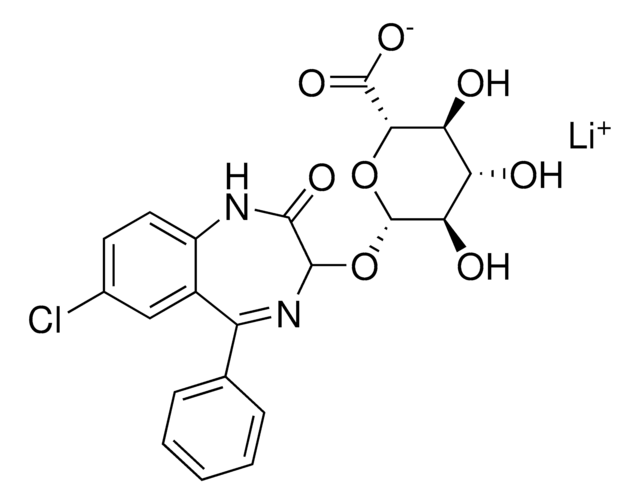445874
mGluR5 Antagonist, MTEP
The mGluR5 Antagonist, MTEP, also referenced under CAS 329205-68-7, controls the biological activity of mGluR5. This small molecule/inhibitor is primarily used for Neuroscience applications.
别名:
mGluR5 Antagonist, MTEP, 3-((2-Methyl-1,3-thiazol-4-yl)ethynyl)pyridine
登录查看公司和协议定价
所有图片(1)
About This Item
推荐产品
品質等級
化驗
≥98% (HPLC)
形狀
solid
製造商/商標名
Calbiochem®
儲存條件
OK to freeze
protect from light
顏色
white to yellow
溶解度
methanol: 1 mg/mL
DMSO: 5 mg/mL
運輸包裝
ambient
儲存溫度
2-8°C
InChI
1S/C11H8N2S/c1-9-13-11(8-14-9)5-4-10-3-2-6-12-7-10/h2-3,6-8H,1H3
InChI 密鑰
NRBNGHCYDWUVLC-UHFFFAOYSA-N
一般說明
A brain-permeable (thiazole-pyridine)alkyne compound that acts as a potent, selective and non-competitive mGluR5 (metabotropic glutamate receptor subtype-5) antagonist (IC50 = 5 nM in Ca2+-flux assay; Ki = 16 nM) with in vivo anxiolytic activity in a rodent model (ED50 = 1 mg/kg, ip and 7 mg/kg, po). Devoid of any side effects seen with MPEP and benzodiazepines. Reported to weakly affect the activities of other enzymes and receptors tested (IC50 = 30 µM for MAO-A, >100 µM for mGlu1R, 2R & 7R, and >300 µM for NR2BR).
生化/生理作用
Cell permeable: yes
Primary Target
mGluR5
mGluR5
Product does not compete with ATP.
Reversible: no
Target IC50: 5 nM in Ca2+-flux assay
Target Ki: 16 nM for mGluR5 (metabotropic glutamate receptor subtype-5)
包裝
Packaged under inert gas
警告
Toxicity: Standard Handling (A)
重構
Following reconstitution, aliquot and freeze (-20°C). Stock solutions are stable for up to 6 months at -20°C.
其他說明
Bradbury, M.J., et al. 2005. J. Pharmacol. Exp. Ther.313, 395.
Busse, C.S., et al. 2004. Neuropsychopharmacology29, 1971.
Roppe, J.R., et al. 2004. Bioorg. Med. Chem. Lett.14, 3993.
Klodzinska, A., et al. 2004. Neuropharmacology47, 342.
Cosford, N.D.P., et al. 2003. J. Med. Chem.46, 204.
Brodkin, J., et al. 2002. Eur. J. Neurosci.16, 2241.
Busse, C.S., et al. 2004. Neuropsychopharmacology29, 1971.
Roppe, J.R., et al. 2004. Bioorg. Med. Chem. Lett.14, 3993.
Klodzinska, A., et al. 2004. Neuropharmacology47, 342.
Cosford, N.D.P., et al. 2003. J. Med. Chem.46, 204.
Brodkin, J., et al. 2002. Eur. J. Neurosci.16, 2241.
法律資訊
CALBIOCHEM is a registered trademark of Merck KGaA, Darmstadt, Germany
儲存類別代碼
11 - Combustible Solids
水污染物質分類(WGK)
WGK 1
閃點(°F)
Not applicable
閃點(°C)
Not applicable
J Brodkin et al.
The European journal of neuroscience, 16(11), 2241-2244 (2002-12-11)
It hs been suggested that metabotropic glutamate receptor subtype 5 (mGluR5) play a role in the expression of anxiety, based on anxiolytic-like effects of the selective mGluR5 antagonist MPEP (2-methyl-6-(phenylethynyl)pyridine) in rodent models of anxiety, including stress-induced hyperthermia (SIH). To
Aleksandra Klodzinska et al.
Neuropharmacology, 47(3), 342-350 (2004-07-28)
Several lines of evidence suggest a crucial involvement of glutamate in the mechanism of action of anxiolytic drugs including the involvement of group I metabotropic glutamate (mGlu) receptors. Given the recent discovery of a selective and brain penetrable mGlu5 receptor
Chris S Busse et al.
Neuropsychopharmacology : official publication of the American College of Neuropsychopharmacology, 29(11), 1971-1979 (2004-08-12)
Previous reports have demonstrated the anxiolytic effect of the potent and systemically active metabotropic glutamate subtype 5 (mGlu5) receptor antagonist 2-methyl-6-(phenylethynyl)pyridine (MPEP) in rodents. Here, we present evidence for the anxiolytic activity of a novel mGlu5 receptor antagonist, 3-[(2-methyl-1,3-thiazol-4-yl)ethynyl]pyridine (MTEP)
Jeffrey R Roppe et al.
Bioorganic & medicinal chemistry letters, 14(15), 3993-3996 (2004-07-01)
Structure-activity relationship studies leading to the discovery of a new, orally active mGlu5 receptor antagonist are described. The title compound, 5-[(2-methyl-1,3-thiazol-4-yl)ethynyl]-2,3'-bipyridine, is highly potent in vitro, has good in vivo receptor occupancy, and is efficacious in the rat fear-potentiated startle
Metabotropic glutamate receptor mGlu5 is a mediator of appetite and energy balance in rats and mice.
Margaret J Bradbury et al.
The Journal of pharmacology and experimental therapeutics, 313(1), 395-402 (2004-12-14)
The metabotropic glutamate receptor subtype mGlu5 modulates central reward pathways. Many transmitter systems within reward pathways affect feeding. We examined the potential role of mGlu5 in body weight regulation using genetic and pharmacological approaches. Adult mice lacking mGlu5, mGluR5-/-, weighed
我们的科学家团队拥有各种研究领域经验,包括生命科学、材料科学、化学合成、色谱、分析及许多其他领域.
联系技术服务部门








